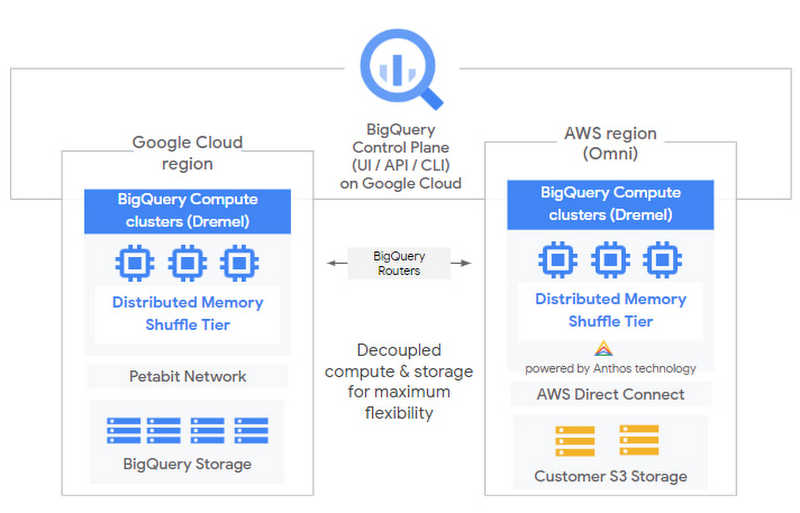| Google Extends BigQuery For Multi-Cloud Analytics |
| Written by Kay Ewbank | |||
| Monday, 20 July 2020 | |||
|
Google has extended BigQuery for use with multiple clouds. BigQuery Omni works with Google Cloud and AWS, and will soon support Azure. Google BigQuery is a distributed, serverless SQL engine that provides a way to query petabytes of data. It has built-in machine learning, is serverless, and already supported Google Cloud. BigQuery Omni is based on Google Cloud Anthos, a hybrid and multi-cloud application platform. Anthos handles the connection between Google Cloud and the other public clouds.
Google Anthos is designed to provide a way to build, deploy, and manage applications anywhere in a secure, consistent manner. It can be used to run managed Kubernetes on both cloud and on-premises environments, with support for Google Cloud, Amazon Web Services (AWS) and Microsoft Azure. It consists of Anthos GKE, a container orchestration and management service for running Kubernetes clusters anywhere; Anthos Config Management for defining, automating and enforcing policies; Anthos Service Mesh for securing and managing traffic between services; and Anthos security that handles the actual security across clouds and hybrid deployments.
The Anthos clusters used to run BigQuery Omini are fully managed by Google Cloud. Anthos was used to build, deploy, and manage the BigQuery query engine (Dremel) on multiple clouds. Until now, BigQuery could only be used with data stored in Google Cloud. BigQuery Omni changes this so users work in the BigQuery interface on Google Cloud, but can query data on other clouds without having to move any data across clouds or make any copies of data. BigQuery Omni’s query engine runs the computations on clusters in the same region where your data resides. One example given was using BigQuery Omni to query Google Analytics 360 Ads data that’s stored in Google Cloud, and also querying logs data from an e-commerce platform and applications that are stored in AWS S3. BigQuery Omni is currently in private alpha. If you’re interested in trying it out, fill out this form.
More InformationRelated ArticlesTo be informed about new articles on I Programmer, sign up for our weekly newsletter, subscribe to the RSS feed and follow us on Twitter, Facebook or Linkedin.
Comments
or email your comment to: comments@i-programmer.info |
|||
| Last Updated ( Monday, 20 July 2020 ) |




